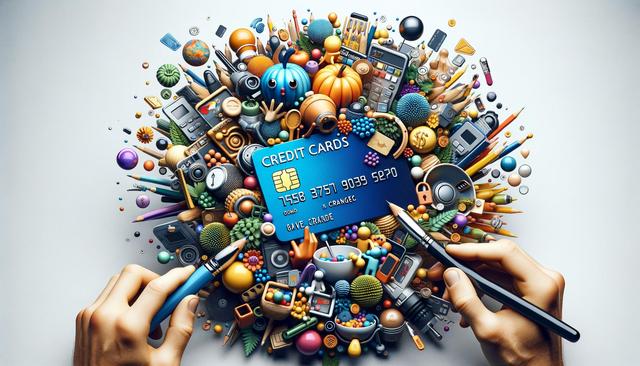Understanding Different Types of Credit Cards
When exploring credit card options for everyday use, it’s essential to understand the various types available, each designed to serve different financial needs and spending habits. Credit cards can generally be categorized into a few main types: rewards cards, low-interest cards, secured cards, and balance transfer cards. For everyday expenses like groceries, fuel, and utility bills, rewards cards are often preferred as they offer points, cash back, or other incentives for frequent purchases. Secured cards, on the other hand, help individuals build or rebuild credit, making them suitable for those with limited or poor credit history.
Low-interest and balance transfer cards cater more to individuals looking to manage existing debt or avoid accumulating high interest on new purchases. Choosing the right type depends on your financial goals and habits. For instance, if you pay your balance in full each month, a rewards card might be a good match. However, if you’re carrying a balance, a low-interest card could be more beneficial. Understanding these categories enables consumers to make informed decisions based on their personal financial circumstances.
Key Spending Features to Look For
Credit card spending features can significantly enhance your everyday financial experience. Some cards offer tiered rewards depending on the type of purchase, while others provide flat-rate cash back on all spending. Additionally, many issuers now offer dynamic tools that help you monitor and categorize your expenses in real-time, making budgeting easier and more transparent.
Here are some spending features to look for when choosing a credit card for daily use:
- Cash back or rewards programs tailored to your spending habits
- Automatic categorization of expenses
- Spending alerts and notifications
- Introductory offers such as 0% APR for a limited time
These features, combined with easy credit card processing and reliable transaction tracking, help users keep control of their finances. In particular, cards that support instant credit card processing allow for fast approvals and quick access to your line of credit, which can be especially useful for managing unexpected expenses.
Effective Credit Card Management Tools
Managing a credit card goes beyond making payments on time. Modern credit cards often come with a suite of tools that help users understand spending patterns, avoid unnecessary charges, and maintain healthy credit. Features like mobile app integration, spending dashboards, and personalized financial advice are increasingly common.
Some notable management tools include:
- Real-time spending alerts and fraud detection
- Monthly spending summaries
- Customizable payment reminders
- Credit score tracking and analysis
These tools provide a clearer picture of your financial behavior and help prevent overspending. Combined with easy credit card processing and seamless payment systems, users can benefit from a smoother and more secure credit experience. Fast and quick credit card processing features also mean that cardholders can manage payments and transactions without delays, improving overall financial efficiency.
Comparing Costs and Fees
Cost is a crucial factor when selecting a credit card for everyday use. While some cards offer no annual fees, others may come with charges that are justified by higher reward rates or premium services. Interest rates, foreign transaction fees, late payment penalties, and balance transfer fees are all important to consider.
When comparing options, it’s helpful to look at:
- Annual fees and whether they are offset by rewards or perks
- APR on purchases and balance transfers
- Penalty structures for late or missed payments
- Foreign transaction and processing fees
For those prioritizing affordability, seeking the cheapest credit card processing options can lead to meaningful savings over time. Cards with transparent fee structures and low processing costs appeal to budget-conscious consumers who want to maximize value from their everyday spending.
Choosing a Card That Matches Your Lifestyle
The right credit card aligns with not only your financial goals but also your lifestyle and daily habits. Whether you’re a frequent traveler, a student, a working professional, or someone managing household expenses, there are cards tailored to fit those specific needs. For example, travel-focused cards often waive foreign transaction fees and offer travel insurance, while student cards may include educational resources and lenient approval criteria.
Matching your card to your lifestyle involves evaluating:
- Your most common spending categories
- Your ability to pay off balances monthly
- Your credit score and financial history
- The features and benefits that will be most useful to you
Look for cards that offer both convenience and support, including instant credit card processing when applying and quick credit card processing for purchases. Easy credit card processing is particularly beneficial for individuals who value efficiency and want minimal hassle during everyday transactions.
Conclusion: Finding Balance in Functionality and Simplicity
Exploring credit card options for everyday use involves more than just looking at reward rates or promotional offers. It’s about finding a card that fits your spending habits, provides valuable management tools, and keeps fees in check. With a wide range of types available, from secured to rewards-focused cards, there’s something for nearly every consumer profile. Prioritizing features like easy and quick credit card processing, transparent costs, and useful financial tools can lead to a more satisfying and responsible credit experience. Ultimately, the goal is to choose a card that supports your day-to-day life while helping you stay financially organized and in control.




Leave a Reply